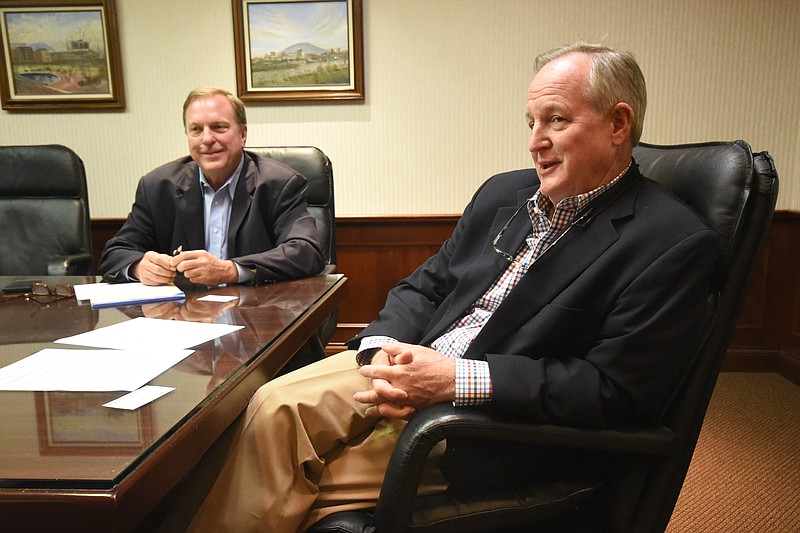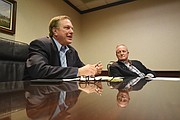By the numbers
' Over $900 million - Projected economic impact from the trade center since its opening in 1985 * $6.2 million - operating budget for 2015 for the convention center * 100,000 - Square feet of column-free exhibit space * 21 - Number of meeting rooms * 221,976 - Number of convention and trade center attendees in 2015 * 446 - Number of events last year at the convention center First event: Tri-State Home Show on April 15, 1985 Biggest convention: Precept Ministries in August 2003 with 8,000 delegates and an estimated 9,113 hotel room nights Biggest overall generator: The annual cheerleading convention every January since 2002 which books about 2,500 hotel rooms and has an economic impact estimated at $6 million a year Biggest single meal: Shaw Industries banquet for 3,500 persons with Berkshire Hathaway CEO Warren Buffett
Trade center at a glance
Owner: Carter Street Corp. Investment: $46 million initial facility and $52 million expansion in 2003 Economic impact: $900 million History: Opened in 1985 and expanded in 2003 Government support: $500,000 from the city of Chattanooga and Hamilton County Executive director: Mike Shuford Staff: 39 full time and about 40 temporary workers Board: Jim Hudson, Curtis Johnson, Hicks Armor, Paul McDaniel, Bill Raines, Don Mercer and Anne Wilkins.
In the early 1980s, when Chattanooga was considering whether to build a publicly funded convention center, many of those in Chattanooga's tourism industry didn't back the idea.
The original developer of the Chattanooga Choo Choo, B. Allen Casey, didn't like the potential competition for his hotel and banquet complex from a bigger convention center. E.Y. Chapin IV, then the president of Rock City Gardens and chairman of the Chattanooga Convention and Visitors Bureau, spoke out against the trade center idea during one of the bureau's annual meetings, claiming local government shouldn't compete with private enterprise.
But 30 years after the government-owned trade center opened in downtown Chattanooga - and a decade and a half after its expansion -- the complex has won over most of its skeptics by helping attract more than 200,000 visitors a year and adding more than $900 million in economic benefits for Chattanooga over its life.
"There was a lot of skepticism before the center opened, but once people saw its benefits the whole community ultimately got behind it," said Mike Shuford, the executive director of the Carter Street Corp., the nonprofit group that operates the trade center. "It is clear that for the last 30 years the center has been a tremendous economic catalyst for downtown Chattanooga, and we plan to continue its exponential impact for the future."
Despite initial concerns about its cost and competition, the city of Chattanooga and Hamilton County governments agreed to build the initial $46 million trade center and parking garage downtown in 1985. Six years later, they began a $52 million expansion of the trade center, which along with the building of The Chattanoogan hotel and the Downtown Resource Center, opened in 2003.
Since the trade center was expanded, the facility has generated an average economic boost to the local economy of about $38 million a year, based upon the average conventioneer spending about $180 a day for hotel and food. The convention complex has hosted more than 400 different events, ranging from fashion shows, to law seminars, to Comic Con.
"In 30 years, the Convention Center has far exceeded our expectations," said Jim Hudson, chairman of the Chattanooga Convention Center. "The center has become a focal point of the community, and a significant economic impact generator and a cornerstone for our tourism industry."
Bob Doak, a former Chattanooga Choo Choo general manager who has headed the Chattanooga Area Convention and Visitors Bureau for he past 14 years, credits the trade center for helping Chattanooga grow its convention business. The trade center has helped attract more regional conventions, trade shows and business seminars to Chattanooga and been a key part of the quadrupling in the size of Chattanooga's tourism industry over the past three decades, Doak said.
The convention business, which tends to be busiest during the school year, also complements Chattanooga's summer-oriented outdoor tourism attractions.
"It's been a tremendous asset and helped us bring many people to our city who would not otherwise have come," Doak said. said. "And once they come for a meeting here, many of them come back to vacation with their family and some even have returned to live here."
The center does requires about $500,000 a year in financial support from local governments to operate. But Hudson said that is still less than half the financial support provided for the comparably sized trade center in Knoxville, which traditionally draws fewer events and visitors each year.
Such government support is typical for most convention centers in America and remains key to keeping costs in line and attracting visitors and conventioneers to the city, officials said.
"This is still an extremely competitive business and we usually have to discount some prices to get major groups here," Shuford said. "Meeting planners are very savvy and they know how to drive a good bargain and play cities off against one another."
One key advantage for Chattanooga's trade center is its location in downtown Chattanooga, Hudson said.
"We're able to not just sell this facility but to sell the city as an attraction for conventioneers," Hudson said. "We have become a very affordable and walkable city that offers not only food and lodging but a lot of entertainment options."
With a free downtown shuttle and attractions such as the Tennessee Aquarium, the Children's Discovery Museum, the IMAX Theater and the Hunter Museum of Art within a mile of the trade center, Hudson said the Scenic City offers a more complete package for conventions than most cities.
"I think that is a major reason why we have been so successful," Hudson said. "People want to come to Chattanooga."
But Hudson said he still wishes there were more attached hotel rooms to the trade center to help serve bigger meetings and conventions.
The trade center was built beneath the 320-room Marriott Hotel, first developed by former Chattanooga developer Franklin L. Haney as one of four such convention centers he erected in the early 1980s in Chattanooga, Knoxville, Nashville and College Park, Ga. A 120-room Staybridge Suites was added on the south end of the convention center when it was expanded 12 years ago. But Hudson said some conventions prefer having more hotel rooms available for their meetings.
"My biggest wish is that we had another 350 attached hotel rooms," Hudson said. "We need a bookend tower."
The trade center works with other downtown hotels to book convention guest through the Chattanooga Area Convention and Visitors Bureau. But while the convention complex doesn't have the direct control of lodging facilities, it does control its own food service, unlike most convention centers.
Chattanooga's trade center built its own kitchen and employs its own food service workers using both full-time and temporary workers.
"We control the quality and the service of our food and we don't have to negotiate through a third party to be flexible in meeting whatever demand a client might have," Shuford said.
Hudson, who has served on the Carter Street Corp. board through five mayors, said the trade center has been able to maintain its consistency by having its own staff with many long-time workers.
"We've worked hard to maintain our service and reliability and we've been fortunate to have a lot of long-term employees stay with us at the trade center," he said.
Contact Dave Flessner at dflessner@timesfreepress.com or at 423-757-6340.

